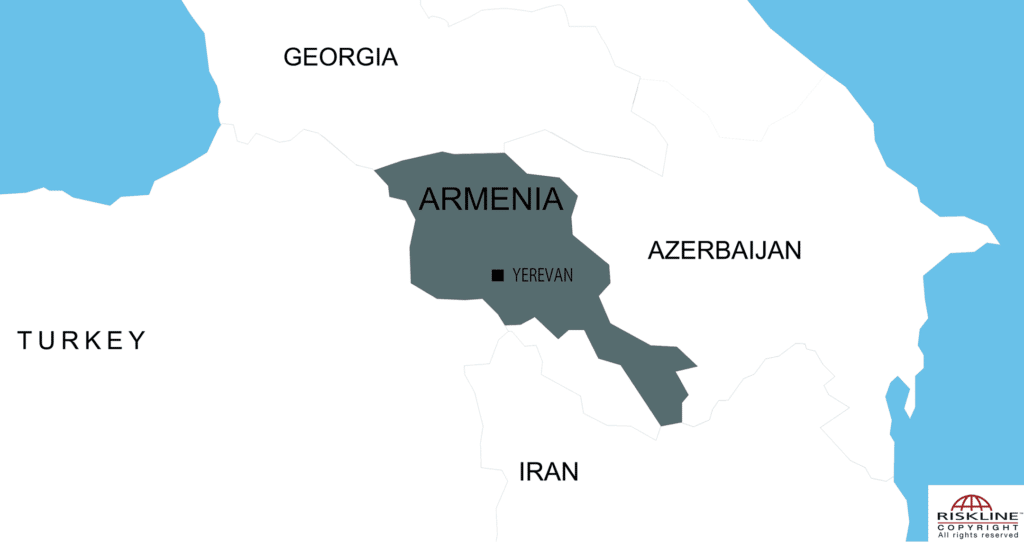On 8 May, opposition leader Nikol Pashinyan was elected prime minister, succeeding longtime leader Serzh Sargsyan, who was ousted following weeks of nationwide mass protests that began in April. This successful conclusion of what Pashinyan declared the ‘Velvet Revolution’ against Sargsyan and the ruling Republican Party of Armenia (RPA) had appeared unthinkable in its beginning when the movement lacked full support from even those within the opposition Yelk (“Way Out”) faction. However, demonstrators gathered in the tens of thousands in Yerevan alone to paralyse the capital until soldiers broke ranks to join the protesters and all parties but the RPA backed the movement. On 12 May, Pashinyan completed forming his cabinet, leading to speculations on what is to come.
Among the issues that drove the protesters’ discontent against Sargsyan and the RPA were the country’s stagnant economy and widespread corruption. Unlike in the coloured revolutions of Georgia and Ukraine, there was no anti-Russia rhetoric in the country, which has been historically dependent on Russia for its security and economy. Instead, Pashinyan sought to unify his supporters with broadly appealing promises, including tackling corruption and poverty. Some of Pashinyan’s plans for the economy echo those of Sargsyan. Similar to the ousted former prime minister, Pashinyan called for repatriating the diaspora population, pursuing economic integration with the European Union and boosting the country’s technology sector. However, meeting his supporters’ expectations will depend not only on economic growth but also on whether he can make good on his promise to tackle the ‘monopolies’ that dominate Armenia’s economy.
Corruption and a stagnant economy are intertwined problems that arise from the patron-client relationship between Armenia’s government and its business elite. As it rose to power in the late 1990s, the RPA built close relationships with oligarchs, who allegedly distribute bribes and intimidate voters in exchange for perks like tax evasion. Among the businessmen who reportedly enjoyed such perks is Gagik Tsarukyan, the richest man in Armenia and founder of the Multi Group conglomerate. Despite nominally being the largest opposition party, his Prosperous Armenia party had often sided with the RPA – until it eventually supported Pashinyan in the aftermath of Sargsyan’s resignation. Meanwhile, pension systems and healthcare infrastructure have severely deteriorated since the Soviet years as unemployment, poverty and emigration rose. Approximately 30 percent of the population live below the poverty line and about 300,000 people, or 10 percent of the country’s population, have left the country since 2008.
As the largest party in parliament, the RPA will continue to stand as a hurdle before the new government can pursue reforms. With the next elections not due until 2022, there is a likely risk of a gridlock between the RPA-majority parliament and the government. Therefore, the first challenge for the new government will be to hold early elections that would presumably give supporters of Pashinyan a chance to take control of parliament from the former ruling party. However, figuring out how to hold one is an uncertainty of its own. Other than two failed attempts to elect a prime minister, only a parliament vote to reject the cabinet can trigger early elections. The RPA is unlikely to exercise this option, as approving the cabinet would allow the former ruling party to delay new elections by at least a year and preserve its majority in parliament. One possible option to bypass the parliament is to call for a referendum. In the aftermath of the revolution, Pashinyan remains a popular leader and voters are likely to approve what may be the only path for him to deliver the promised reforms.
Sargsyan’s ouster and Pashinyan’s election represented a rare victory for the people in a country where elections have been routinely rife with allegations of fraud. However, Pashinyan faces difficult challenges before he can fulfill his promises to tackle corruption and poverty that have plagued Armenia for decades. As the euphoria of the Velvet Revolution gradually fades, early election will be the first step that the government must take to ensure that the dream of a new era remains viable. As the RPA remains the largest party in parliament, Pashinyan’s best bet is likely in leaving this question to the voters, the same people who put him in power.















